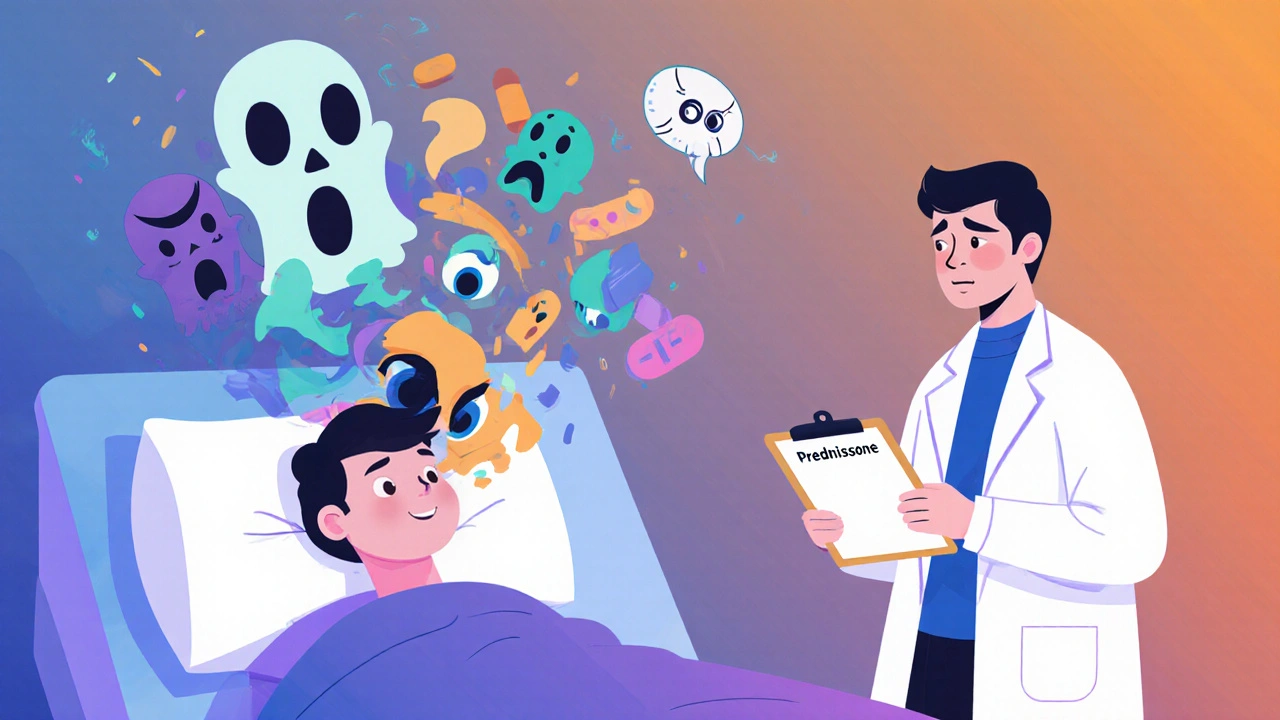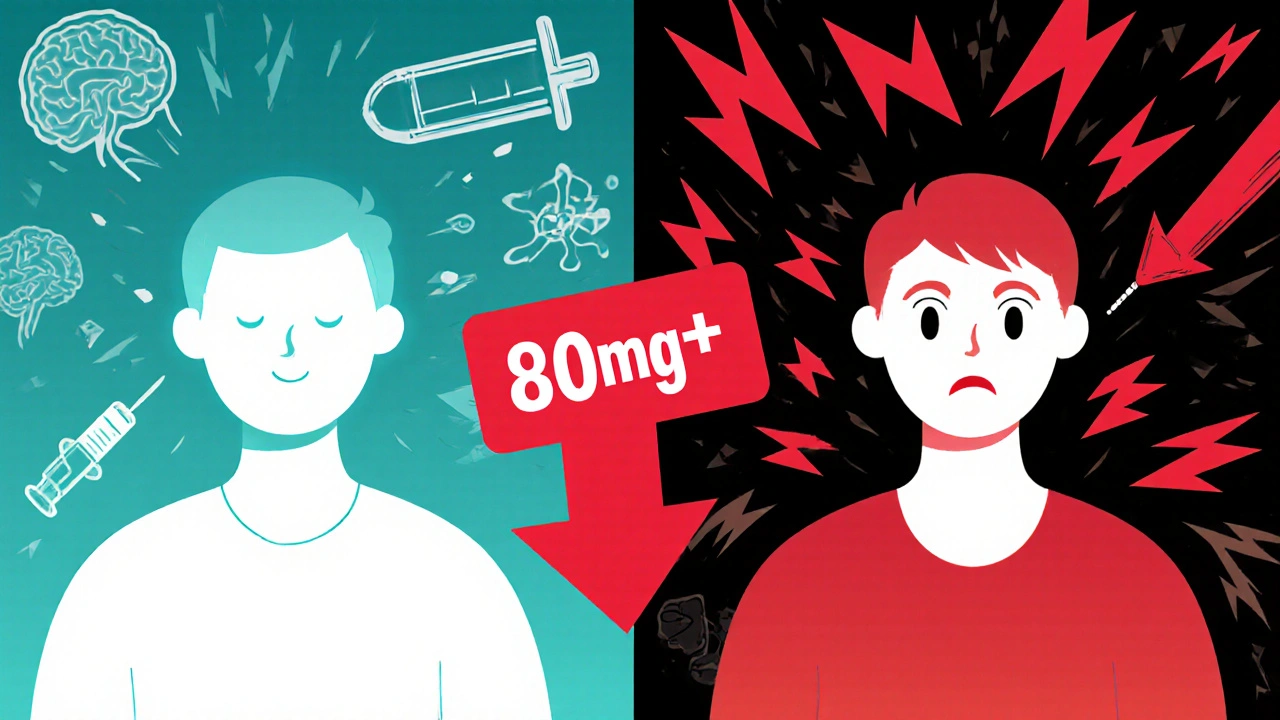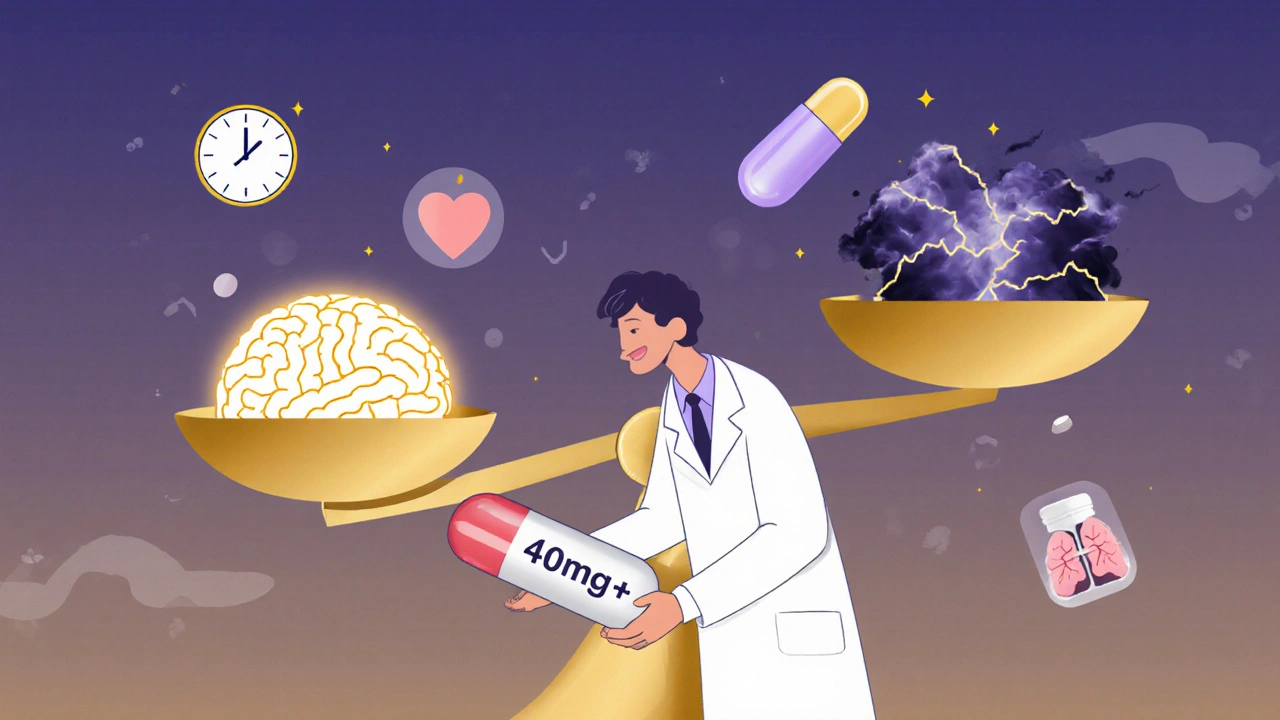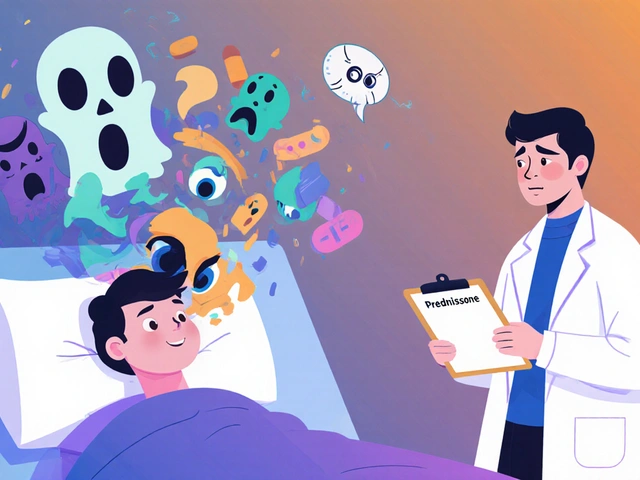Steroid-Induced Psychosis: How to Recognize and Treat It in an Emergency

Steroid Psychosis Risk Calculator
Steroid Psychosis Risk Calculator
Enter your daily prednisone equivalent dose to estimate psychosis risk
When Steroids Trigger Psychosis: A Silent Emergency
Most people think of steroids as tools to reduce swelling or calm autoimmune flares-something doctors prescribe to help you breathe better, manage lupus, or recover from a severe flare-up. But behind the relief, there’s a hidden risk: steroid-induced psychosis. It doesn’t happen often, but when it does, it hits fast, hard, and can turn a hospital stay into a crisis. You might start feeling off-confused, irritable, or paranoid-within just a few days of starting high-dose steroids. By day five, you could be hearing voices, believing things that aren’t true, or acting out in ways that scare your family and doctors. This isn’t just ‘being moody.’ It’s a medical emergency.
How Common Is It?
It’s not rare. Studies show that between 2% and 60% of people on high-dose steroids develop some kind of psychiatric problem. That wide range isn’t because the data is bad-it’s because risk climbs sharply with dose. At 40 mg of prednisone a day, about 4.6% of patients start showing symptoms. At 80 mg or more? That jumps to 18.4%. In one Boston-based study from the 1970s, that pattern held true: higher dose = higher chance of mental breakdown. And while depression and mania are more common overall, full-blown psychosis-with hallucinations and delusions-shows up in about 14% of cases. The scary part? Many of these patients aren’t psychiatric patients. They’re people with asthma, Crohn’s, or rheumatoid arthritis who just needed help getting their body under control.
What Does It Look Like?
Steroid psychosis doesn’t start with screaming or violence. It starts quietly. A patient might seem unusually distracted. They forget appointments. They’re restless, pacing, or snapping at nurses. These are early red flags-confusion, agitation, perplexity-often appearing within 1 to 5 days of starting the steroid. By day 7, it can escalate: delusions that someone is poisoning them, hearing commands in their head, believing they’re being watched. Mania can show up too-grandiose ideas, no need for sleep, reckless spending. Depression? That’s more common in long-term users. But when psychosis hits suddenly, it’s usually tied to a recent spike in dose. And here’s the key: it’s not schizophrenia. It’s not bipolar disorder. It’s a reaction to a drug. If you don’t connect the dots, you’ll treat the wrong illness.

Why Does This Happen?
Steroids aren’t just anti-inflammatory-they’re powerful brain disruptors. They mimic cortisol, your body’s natural stress hormone. When you flood your system with synthetic versions like prednisone or dexamethasone, you throw off the balance between your brain’s glucocorticoid and mineralocorticoid receptors. This messes with how your brain handles mood, memory, and perception. Think of it like turning up the volume on your stress response until it’s deafening. That’s why symptoms look so much like Cushing’s syndrome or even withdrawal from adrenal insufficiency. The brain doesn’t know the difference between your body’s cortisol and the pill you took. It just knows something’s wrong. And that’s why symptoms vanish when you lower the dose-your brain starts to recalibrate.
Emergency Response: What to Do Right Now
If someone on steroids suddenly becomes psychotic, the first rule is: Don’t wait. Don’t assume it’s ‘just stress.’ Don’t send them home with a sleeping pill. The priority is safety-yours, theirs, and everyone around them. Start with de-escalation: speak calmly, remove crowds, dim the lights. If they’re violent or suicidal, physical restraints are a last resort. They cause trauma and make things worse. Instead, use medication. For mild cases, oral olanzapine (2.5-10 mg) or risperidone (1-2 mg) often calms symptoms within hours. For severe agitation, intramuscular olanzapine or haloperidol (2-5 mg) works fast. But here’s the catch: you don’t need a full psychotic dose. The standard 10-20 mg of olanzapine used for schizophrenia? That’s too much here. Stick to half or even a third of that. Overmedicating leads to tremors, stiffness, or worse. And always pair haloperidol with benztropine or diphenhydramine to prevent movement side effects.
The Real Fix: Tapering the Steroid
Medication helps-but it’s not the cure. The cure is lowering the steroid. Studies show 92% of patients recover fully once the dose drops below 40 mg of prednisone (or the equivalent in other steroids). That’s not a guess-it’s documented in multiple hospitals across the U.S. So if someone is psychotic, you don’t just treat the psychosis. You treat the cause. Work with the prescribing doctor. Can you cut the dose in half? Switch to a shorter-acting steroid? Can you switch to a non-steroid alternative? Sometimes, yes. But if the patient has a life-threatening condition-like a transplant rejection or severe vasculitis-you can’t just stop. Then you manage both: taper as safely as possible, while using low-dose antipsychotics as a bridge. Lithium can help prevent mania, but it’s risky with kidney or thyroid issues. SSRIs and mood stabilizers like valproate? They sometimes help, but the evidence is thin. Stick to what works: reduce the steroid, use minimal antipsychotics, monitor closely.

What Doctors Often Get Wrong
A 2022 survey of emergency doctors found that 89% knew steroids could cause psychosis. But only 43% followed the right tapering protocol. Why? Because they’re scared. They think, ‘If I lower the steroid, the patient’s inflammation will flare.’ Or they give too much antipsychotic because they want to ‘get control fast.’ Both mistakes happen. Giving 30 mg of olanzapine to someone with steroid psychosis is like using a sledgehammer to fix a cracked window. You’ll break more than you fix. The American College of Emergency Physicians updated its guidelines in 2023 to say: use 50-75% less antipsychotic than you would for primary psychosis. And always check for mimics. Is the patient hyperglycemic? Dehydrated? Infected? High blood sugar from steroids can look like psychosis. A simple glucose test, electrolyte panel, and infection screen can rule out 30% of false positives.
What’s Coming Next
Researchers are working on ways to predict who’s at risk before it happens. The NIH is tracking 500 patients on high-dose steroids, looking for genetic markers or blood proteins that signal trouble ahead. Early results suggest some people have a biological vulnerability-like a glitch in how their brain responds to cortisol. By 2025, a new clinical tool from the American Psychiatric Association will help doctors input a patient’s steroid dose, age, past mental health history, and lab values-and get a real-time risk score. That’s huge. It means we might soon prevent psychosis before it starts, not just treat it after it explodes.
Final Takeaway
Steroid-induced psychosis is treatable. It’s not a life sentence. It’s not a sign of weakness. It’s a known side effect of powerful medicine. The key is recognizing it early-not waiting for someone to be screaming in the ER. If you’re prescribing steroids, watch for agitation in the first week. If you’re caring for someone on steroids and they seem ‘off,’ push for evaluation. Don’t let it be dismissed as ‘just anxiety.’ And if it happens? Taper the steroid. Use low-dose antipsychotics. And remember: this isn’t mental illness. It’s a drug reaction. And when you treat it right, most people bounce back completely.


Emily Barfield
I can't believe we still treat this like a medical anomaly when it's clearly a systemic failure of psychiatric awareness in clinical practice. Steroids aren't just drugs-they're neurochemical grenades, and we're handing them out like candy at a parade! People aren't 'going crazy'-their cortisol receptors are screaming in terror, and we're slapping on antipsychotics like bandages on a ruptured artery. This isn't psychiatry. It's arson with a stethoscope.
Rahul hossain
One must question the moral responsibility of physicians who prescribe such potent pharmacological agents without adequate psychiatric screening. The sheer negligence in overlooking the neuroendocrine cascade is not merely unprofessional-it is ethically indefensible. One wonders whether the medical-industrial complex has replaced Hippocratic Oath with profit margins.
Abha Nakra
I'm a nurse who's seen this happen three times. First time, I thought the patient was just stressed. Second time, I asked for a psych consult. Third time? I flagged it the moment they started pacing and muttering about 'the vents listening.' Tapering the steroid cut the symptoms in half within 12 hours. You don't need to be a genius-just observant. And please, stop overmedicating. Less is more here.
Neal Burton
The fact that emergency physicians are still using haloperidol as a first-line intervention suggests a profound stagnation in clinical education. The literature has been clear since 2017 that low-dose atypicals are superior in steroid-induced psychosis. The persistence of antiquated protocols is less a matter of ignorance and more a reflection of institutional inertia. One wonders if the AMA even reads its own journals anymore.
Tamara Kayali Browne
The 2%–60% range is statistically meaningless without stratification by comorbidities, duration of use, and baseline cortisol levels. This article reads like a sensationalized op-ed masquerading as clinical guidance. Where are the confidence intervals? The multivariate regression models? The control groups? Without these, the entire premise collapses into anecdotal speculation dressed in medical jargon.
Nishigandha Kanurkar
They don't want you to know this-but steroids are part of a secret government mind control program. The NIH isn't studying genetic markers-they're testing how fast the brain can be hijacked by synthetic cortisol to create obedient citizens. That's why they downplay it. That's why they call it 'side effect.' Look at the timing: every major pandemic, steroid use spikes. Coincidence? Or controlled destabilization? They're turning people into walking zombies so we won't question authority.
Lori Johnson
OMG I had this happen to my cousin!! She was on prednisone for her eczema and started talking to her mirror like it was her dead grandma. I called 911 and they just gave her benzos and sent her home. I cried for three days. But then her doctor finally lowered the dose and she was BACK-laughing, baking cookies, everything. I just want people to know: it’s NOT in their head. It’s the pills. And it’s fixable. Please, if you're reading this and someone you love is acting weird on steroids-DON’T WAIT.
Tatiana Mathis
This is one of the most clinically accurate summaries of steroid-induced psychosis I've encountered in recent years. The emphasis on dose-dependent risk, the distinction between primary psychiatric illness and iatrogenic psychosis, and the emphasis on minimal antipsychotic dosing align precisely with current consensus guidelines from the American Psychiatric Association and the Endocrine Society. The inclusion of the 2023 ACEP update is particularly valuable-it corrects a widespread and dangerous overmedication trend. I would recommend this as mandatory reading for all residents in internal medicine, emergency medicine, and rheumatology. The neuroendocrine mechanisms described are elegantly explained without oversimplification. The fact that 92% of patients recover upon dose reduction is not just statistically significant-it's profoundly hopeful. This is the kind of content that elevates public understanding of pharmacology beyond fear and stigma.
Michelle Lyons
I'm not saying this is a conspiracy, but... have you ever noticed that every time someone gets diagnosed with steroid psychosis, the hospital immediately cuts their dose and then bills the insurance for a 'psychiatric evaluation'? Coincidence? Or is the real goal to shift liability from the drug to the patient's mind?